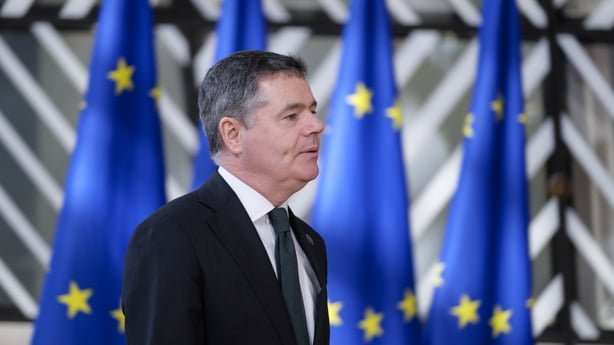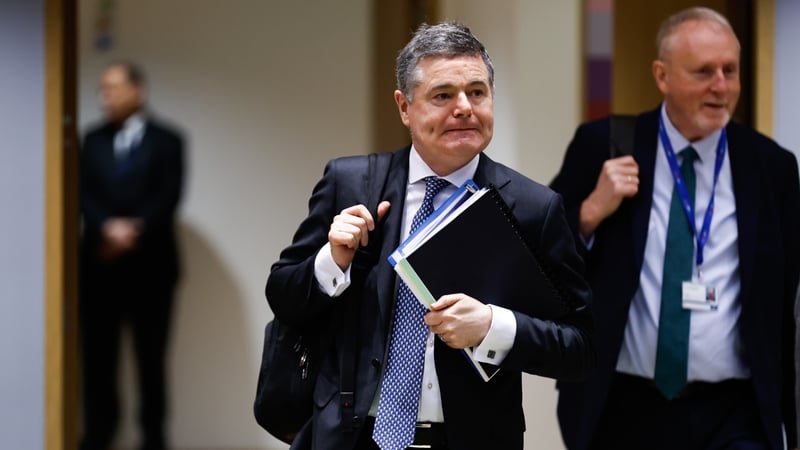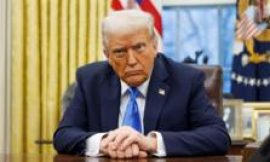Minister for Finance Paschal Donohoe has warned growth in employment in Ireland could be reduced by 2% or 3% as a result of US tariffs.
He said: “Overall if we do end up in the position of a real intense trade dispute developing in different parts of the world, it does mean the risk of prices going up, of fewer new jobs being created and our economy growing slower is a very real risk.”
Minister Donohoe said Ireland was approaching the trade tensions from a position of economic strength.
He added that “as we move through the year the amount of uncertainty we are facing is increasing.”
It would be “very hard to make longer term predictions regarding where our economy or where the European economy will stand,” Minister Donohoe said.
He added Ireland was engaging with the EU and America to see if it was possible to put in place measures to avoid the imposition of tariffs on alcoholic drinks exported from the EU to the US.
He said he “absolutely understood” the concerns of the Irish food and drinks industry following the Trump administration’s threat of 200% tariffs on EU drink products.
US tariffs could hit employment in Ireland, report warns
Earlier, a new study suggested that US tariffs could hit employment in Ireland, result in multinationals relocating and damage the public finances.
The working paper by the Economic and Social Research Institute and the Department of Finance found the domestic economy could contract by 2% over the next five to seven years if US tariffs on EU goods are imposed.
The report says Gross Domestic Product, a measure of the economy which includes the contribution by multinationals, could drop by 3.5%.
It also found the imposition of non-tariff barriers, such as changes in regulatory requirements which would restrict access for Irish exports, would reduce GDP by 3% and the domestic economy by 1.5%.
The paper suggests traded sector, or the part of the economy which is dominated by exporters including pharmaceutical and technology companies, “is likely to be disproportionately impacted by these protectionist measures due to its strong linkages to the global economy.”
We need your consent to load this rte-player contentWe use rte-player to manage extra content that can set cookies on your device and collect data about your activity. Please review their details and accept them to load the content.Manage Preferences
The study says that the level of production in this sector, could fall by 4% over the next five to seven years, compared to a 2% drop in the domestic economy.
The report notes a there is a “disproportionate impact” of protectionist policies by the US on the traded sector has the “potential to further negatively impact the overall economy because those employed in the traded sector tend to be more educated and better paid than the overall workforce.”
The study says if the US targets specific sectors, which are important to the Irish economy, it could result in a “greater decline in the traded sector” and would be even “more severe” than the scenario outlined in the report.
Dr Paul Egan, a research officer at the ESRI says: “Our research shows that protectionist policies have the potential to significantly impact the Irish economy, with the traded sector disproportionately affected.”
“This, in turn, would lead to a significant impact on the labour market, consumption and the domestic economy as a whole,” he says.
“Protectionist policies may also prompt multinationals to relocate to the US, posing further risks to the Irish economy and public finances,” he adds.
The study considers unilateral tariffs, where the US imposes import taxes of between 10% and 25% on the rest of the world and the EU without a response as well as bilateral tariffs where the rest of the world and the EU responds with reciprocal taxes.
The paper also examines the potential impact of a 10% non-tariff barrier imposed by the US on the rest of the world including regulatory requirements which would restrict market access for Irish and global exporters.

Commenting on today’s ESRI report, Minister Donohoe said there was clearly unprecedented levels of uncertainty regarding the global trade architecture, adding that the possibility of tariffs on transatlantic trade being introduced can not be ruled out.
“Government must, of course, plan for all eventualities, and the work being published today by my Department and the ESRI provides one piece of the analytical jig-saw needed to chart a way forward,” the Minister said.
“Ireland has been a massive beneficiary of globalisation and we remain a strong advocate of free-trade policies. Ireland and the US enjoy a mutually beneficial, two-way economic relationship,” he said.
“Government will continue to work to improve the enterprise climate in Ireland, including by ramping-up capital spending in key strategic areas, including energy, water, transport and housing. This is how we will remain competitive against a backdrop of heightened uncertainty,” he added.
Europe shouldn’t get sucked into trade war with US – Doherty
Europe needs to take a breath and not get sucked into a trade war with America, Sinn Féin has said.
Finance spokesman Pearse Doherty was reacting to the ESRI report that warned of the potential economic implications of a damaging trade war.
Speaking at Stormont where dozens of senior Sinn Féin elected representatives from both sides of the border had gathered, Mr Doherty said the ESRI report was “helpful” in setting out the various scenarios.
“The only way to win a trade war is not to be involved in the first instance,” he said.
“And I would hope that what we need now is discussions between the American administration and the European Union, to recognise that this is not in the advantage of any citizens, whether they’re European or American, to actually have this type of reciprocal trade war,” he said.
“And I think that Europe needs to take a breath and not react knee jerk in relation to anything that may come down the line from the American administration,” he added.
Mr Doherty said the paper also supported Sinn Féin’s position that the new global economic uncertainty should encourage investment to support capacity in the Irish economy.
“We need to build up the capacity in terms of our own domestic sector, our infrastructure housing, obviously been a major issue that many of the companies, both multinational and national, mentioned to us, and the need to invest in our infrastructure to make sure that we remain competitive in light of any international events, some that are outside of our control,” he said.




